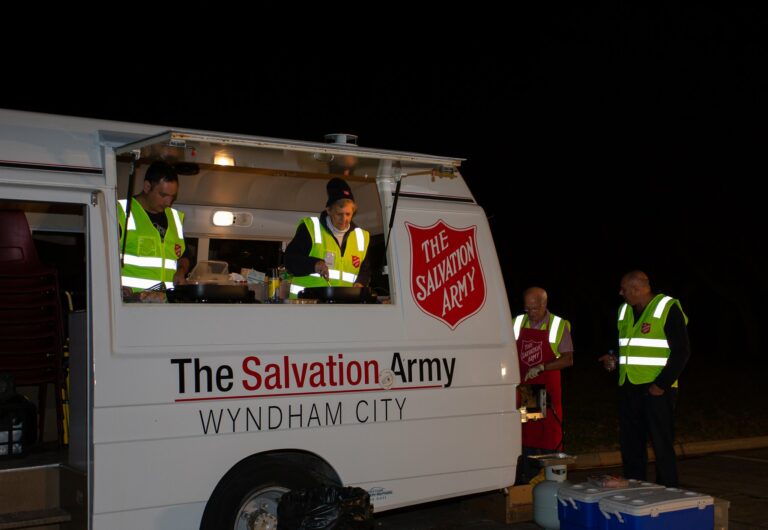Here’s an excerpt from our interview with Werribee Salvation Army, whose leaders, Captain Catherine Abram and Captain Phill Abram and their team, build their health and vitality through approaches such as this.
Read the conversation below.
NCLS: Can you tell me about your thoughts on the vitality of your church over the years?
PA: The Corps has been here on this site for ten years, but they’ve been in Werribee surrounds… over in Hoppers Crossing, for 80 years or something like that prior. The Salvation Army’s reputation goes a long way in lots of places.
Each leader that’s been here has had a slightly different focus, so the guys previous, although they had a spiritual growth purpose, they were a bit more community minded. There were a few different teams that started that community mindedness or that community support network flowing through. So, it’s been transitioned. It ebbs and flows over the last few years, hasn’t it?
CA: Yes, I think it’s probably the reason there’s consistent growth. It’s not just that we’ve had one particular leader and it’s just that there’s such a strong leader that the corps has just exploded in numbers and then when they’ve left the numbers have gone down.
I think it’s the DNA of the place, that one leader has just built on another leader and you can see the consistent growth over the ten years, probably. I think that speaks into the actual leadership base here. It’s not just the one leader.
We’ve seen churches where you’ve got a dynamic, charismatic leader and people are just drawn to the leader but when the leader’s gone it just goes. I think because this congregation has also equipped and sent out other leaders that are serving full time in ministry in other places, I think speaks highly.
NCLS: What wisdom or learning would you like to share with other church leaders on why your church has flourished in your context?
PA: I reckon part of it’s being grateful for the past. For calling it out and saying… There’s no ego. There’s no “If only you did this this way then we wouldn’t be in this situation”. It’s “Thank God you did that, thank God you did that, thank God you did that because now I can…”.
CA: Yes, it’s a real sense of the spirit of God. There’s a real anointing. When you look at the past and the amount of people that have been sent into ministry. A lot of people reflect back and say, oh, a lot of the officers are now in high positions within the Salvos. I think it’s actually not reflected in the people as such, (though yes it may, and their skillset), but a congregation has the ability to kill a leader. It’s actually the DNA of the people here to build up leaders and then there is something that the spirit of God is doing here that you can’t define.
There’s some sort of work of the spirit that we can help facilitate but really, it’s people being open to the spirit of God. They really are.
We’ve been looking at that Craig Groeschel book “It”.. what’s the It Factor? This place has the It Factor.
You look at the leaders that have left and they’ve gone into divisional roles and territorial roles. It’s that the people have embraced them as leaders and have pushed them forward, they haven’t pushed them down, they haven’t killed them. They’ve really said… “You go forward, you lead us”.
NCLS: It sounds like you’re describing the congregation itself is helping leaders to flourish.
PA: Yes.
CA: Yes.
NCLS: So, while the church is flourishing, you’re saying that the leaders are flourishing too and they’re going forward.
PA: It goes both ways. It’s that we give our best, so that you can give your best.
CA: I’m here to support you. And the prayer…
When we first got here and met the elders of the church, before they gave us the keys they said, we need to stop and we need to pray. That’s what you want. You want Godly leaders whose first instinct is to say, let’s get on your knees and pray. How many places is that the first response? “What is God saying about this? Let’s tap into the things of God first and then the other things will follow.”
PA: Yes. I think the spiritual elders are seriously spiritual elders. Rightly or wrongly I refer to them as the legends around the church. The atmosphere is different when they’re not here than when they’re here. It’s not much different but you just know when they’re not around because they’re grey nomads and they can disappear for three, four, five, six, seven months at a time. But when they’re all here together, there’s something significant about them being here and calling them out for who they are.
They are the saints … People are standing on their shoulders. I’ll like to call them the living legends and they don’t like it much, but it doesn’t matter.
CA: I think it’s their humbleness of, oh, I’m not that good. I’m just doing what every Christian should do.











